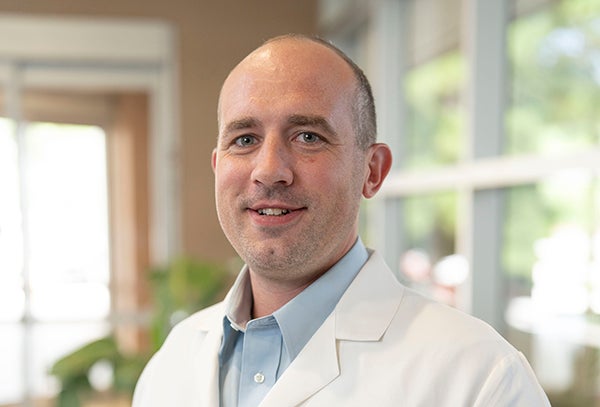Take 5 with Orthopaedic Surgeon Lincoln Pratson, MD
October 7, 2024
By: WakeMed Health & Hospitals
Categories: Wake Orthopaedics, Orthopaedics
Tags: Arthroscopic Joint Surgery, Hip Arthroscopy, Knee Arthroscopy
This fall, we are happy to introduce the newest member of our WakeMed Orthopaedics team, Lincoln Pratson, MD. With the recent completion of his fellowship and an eagerness to serve our patients, Dr. Pratson comes to us with a wealth of knowledge and skill regarding the latest interventions in knee and hip arthroplasty.
Take a few minutes to get to know him and learn about his interests and medical research.
What do you enjoy most about Autumn?
I enjoy being outside and riding bikes in the fall. Since I grew up in Chapel Hill, most of my trail rides have been along the Brumley Nature Preserve. Moving to Raleigh this past summer, I participated in a marathon along Harris Lake and enjoyed those trails, so I'm looking forward to exploring more in this area, including the Umstead Trail system.
When I'm not cycling, I love getaways to the mountains. My wife, son and I lived in Roanoke, VA, this past year, while I was finishing my fellowship. We hiked a lot, and we're going to do that as much as possible this fall, especially with the leaves changing color.
You mentioned growing up in Chapel Hill. Are you a North Carolina native?
My family relocated to Chapel Hill, so I completed middle school and high school here. I remained here for college, earning my undergraduate degree at University of North Carolina at Chapel Hill; completing medical school at East Carolina University Brody School of Medicine in Greenville, NC; and returning to Chapel Hill for residency at University of North Carolina Hospitals.
Following college, we relocated for a period of time for work. My wife is a true North Carolina native and grew up just outside of Hillsborough, so we're both very excited to be back.
Why did you join WakeMed?
During my orthopaedic residency, I rotated at WakeMed. It was a favorite rotation among all the residents.
I spent nine months at WakeMed, and I thoroughly enjoyed my time here, so I made it clear that I would love to come back. Luckily, the timing worked out that they were looking to hire someone specializing in hip and knee replacements when I was finishing training.
WakeMed is a great combination of a culture that encourages hard work and autonomy. Yet, given the multispecialty approach, both within orthopaedics and overall in medicine, we each have help when we need it.
Also, it's pretty neat to find a hospital system that is focused on a specific community. Typically, large hospital systems — that are continually growing — lose that personal touch. Yet, it's very clear at WakeMed that the mission and focus are centered on the community throughout greater Wake County.
Why did you become an orthopaedic surgeon?
In high school, I developed a passion for working with my hands through service-based construction projects. That interest carried through to college, where I majored in athletic training, allowing me to take a hands-on approach to health care. Once I was exposed to orthopaedics in medical school, I knew it was the field for me. It combines the intricate focus on the musculoskeletal system with hands-on, technical work and gives me the chance to make a direct impact on patients' lives.
As an active person, I believe one of the greatest gifts I can give is the gift of mobility. Helping patients regain their independence and lead active lives drives my passion for orthopaedics.
Tell us about your clinical interests and medical research.
My clinical focus includes direct anterior total hip arthroplasty (for both primary and revision surgeries), minimally invasive surgery and complex primary and revision hip and knee arthroplasties.
From a research standpoint, I plan to continue exploring the influence of positive psychological traits, such as resilience and grit, on patient outcomes following total hip and knee arthroplasty.
While it is well established that negative psychological factors, including depression and anxiety, are associated with poorer outcomes after these procedures, the potential protective effects of resilience and grit remain largely unexamined. If we can demonstrate a significant correlation between these positive psychological traits and improved postoperative outcomes, the next step would be to develop targeted interventions for individuals with lower levels of resilience and grit. Such an approach could help ensure that all patients achieve optimal results following joint replacement surgery.
Please share your approach to patient care.
I treat each patient the way I’d treat a family member. Undergoing surgery is a big decision, and I make sure that we have exhausted all non-operative treatment options before considering surgery. If surgery is the best option, I put all my effort into providing a joint replacement that will stand the test of time, last as long as possible and hopefully prevent any need for a revision.
Before moving forward with surgery, I make sure three key criteria are met:
- I confirm that the patient’s pain is originating from the knee or hip joint.
- I ensure I have tried all non-operative treatments.
- Last, I ensure that the symptoms are preventing the patient from doing what he/she wants, needs and loves to do.
Once these criteria are met, we can confidently discuss the appropriate surgical option together.
Ready to schedule an appointment with Dr. Pratson? Learn more about his practice locations and availability.